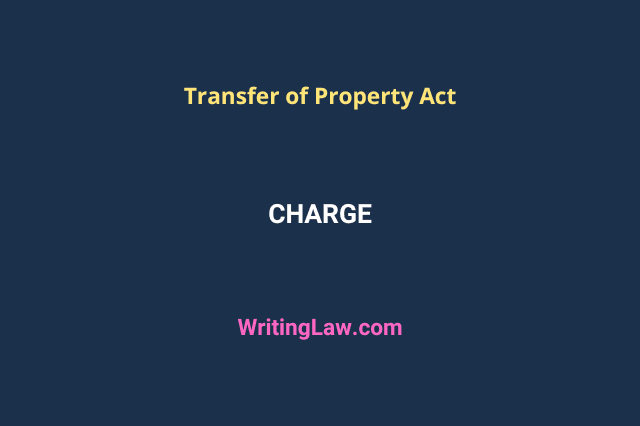
This Transfer of Property Act law note tells you what is charge as per section 100, its essentials, and how it differs from a mortgage.
What Is Charge in TPA?
According to section 100 of the Transfer of Property Act, 1882, when the immovable property of one party is (by an act of parties or operation of law) pledged as security for the payment of money to another, and the transaction does not constitute a mortgage, the later would acquire a charge over the property.
In simple terms, a charge is a claim against an immovable property acquired by one person (by the act of parties or by operation of law) as security for payment to another, and the property is not mortgaged.
A charge on immovable property is created to secure payment of money. The payment is made out of the property charged if it is not made by the person responsible for such payment. The charge does not amount to a transfer of any interest in the property in favour of the charge holder.
Let us take an example.
X has two daughters, P and Q. X gives his entire property to P and puts a condition that P would be under an obligation to pay Rs 10,000 out of the property every month to Q. This amount of money would constitute a charge in favour of Q. If P sells the property to a third person (say Z), then Q can enforce her right against the third person provided he (the third person, Z) has notice of this charge.
What Are the Essentials of Charge?
These are the three primary requisites of charge as per section 100 of TPA:
(i) Immovable property of one person is made security for the payment of money to another.
A charge can only be secured by specific immovable property; otherwise, the charge is null and void. A clear intention must exist to use the property as a security for the payment.
(ii) By the act of parties or by operation of law.
An agreement between the parties creates a charge. There is no specific form of language or words that must be used to create a charge. When the document indicates the intention of using the property as a security for the payment of the money, without transferring any interest or right in the property, it will be enough to create a charge.
A charge can also be created by the operation of law. This means the charge was imposed against the parties, against their will, without their intention, but the law compelled them to comply with the obligations of the charge.
For example: An order of the court creates a charge upon certain property of the husband to support her deserted wife for the remainder of her life.
A charge is created by operation of law under section 55(4) of TPA in the case of the unpaid vendor.
(iii) This transaction does not amount to a mortgage.
Unlike a mortgage, a charge represents neither a transfer of property nor a transfer of rights but rather the creation of a personal obligation or a right to payment out of a specified property. All mortgages have a charge, but no charges are mortgages. It is important to note that the charge is subject to the same provisions as a simple mortgage.
What Is the Difference Between Charge and Mortgage?
In the case of JK Bombay Private Ltd vs New Kaiser-I-Hind Spinning and Weaving Co Ltd (1968), the Supreme Court noted that a charge doesn’t convey a property interest but rather a right to take payments from the property, whereas a mortgage transfer a property interest. Furthermore, it is not necessary to use a specific phrase to establish a charge. The court said that to make a property security for payment, there only needs to be a clear intent to do so.
Here are the major differences between charge and mortgage as per the Transfer of Property Act:
Charge: Defined in section 100 of the Transfer of Property Act, 1882 Act.
Mortgage: Defined under section 58 of the Transfer of Property Act, 1882 Act.
Charge: No transfer of interest.
Mortgage: Transfer of an interest in the property.
Charge: There may or may not be a debt.
Mortgage: Transaction for the security of repayment of a debt
Charge: It can be in oral and written form.
Mortgage: It must be in writing.
Charge: It is Right in Personam, that is, enforceable against a person.
Mortgage: It is Right in Rem, that is, enforceable against the world. Must See: What Is Right in Rem and Right in Personam
Charge: Registration is compulsory only when it is created by the act of the parties.
Mortgage: Registration is compulsory.
Charge: It is created either by an act of parties or the operation of law.
Mortgage: It can be created by an act of parties.
Read Next:
1. What Is Mortgage and Six Types of Mortgage
2. Important Sections of Transfer of Property Act
3. Read Full Transfer of Property Act, 1882
- What Is Remission Under Criminal Law in India? - 12th November 2023
- What Is the Doctrine of Part Performance Under the Transfer of Property Act? - 4th September 2023
- What Is the Places of Worship Act, 1991 and Its Objectives? - 30th July 2023







